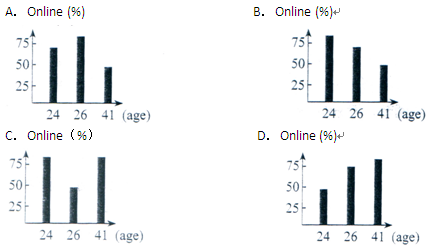题目内容
the Third World.
B. belonged to
C. belonging to
D. to belong to

A study shows that about two-thirds of typical Chinese Internet users use the computer for news,often entertainment-related, or for online games, music or movies, all of which can be downladed for free. Most people prefer messages to e-mails, and seldom do online shopping at all.
Although they are now depending on the Internet more often than before to communicate with others who have the same professions, hobbies and interests, online shopping still remains unpopular in China. Three-quarters of users surveyed have never bought anything over the Internet, and 10 percent do shopping even once a month.Among those who do buy online.most pay for entertainment while others buy phone cards, or computer hardwares or so of iwares.
"Many people don't trust the quality of goods bought online," the researcher said. "If they buy something in a store and don't like it, they can easily bring it back."
The survey was done in Beijing, Shanghai, Guangzhou, Chengdu and Changsha. There-
sults do not necessarily show the situation countrywide because internet use in the countryside is lower than in cities. The study showed that the typical netizensc网民) in the five cities are richer and more highly educated. Males make up two-thirds of the group, and more than 80 percent of users are under 24. As the age increases, the percentage of netizens decreases.
China has more than 20 million people online, however, forty-two percent say they do not use search engines.Others seek entertainment news, as well as information useful for work or study online. Baidu.com is used by half of those surveyed, compared with a quarter for Go-ogle, the leading search engine in the United States.
【小题1】The passage is mainly about .
| A.shopping online | B.Internet use in China |
| C.the typical Chinese netizens | D.popular search engines |
| A.likes to send e-mails | B.likes to buy goods online |
| C.likes to pay for entertainment | D.likes the games sites |
| A.it is more difficult to return the goods |
| B.most people haven't got computers |
| C.people can't have a look at the goods |
| D.goods bought online are of good quality |
| A.Well educated. | B.Richer. | C.Female. | D.Young. |

Here in China, as the awareness of climate change improves, realizing a low-carbon way of life, also known as reducing your carbon footprint, is a growing trend among young Chinese.
Zheng Xiyu works at 1. office in Beijing’s Central Business District.Every day, 2. takes her roughly 40 minutes to go to work by bus.But she is thinking of 3. (switch) to a different way of transport--a bicycle.When buying clothes, she will choose those purely made of cotton, 4. it takes less carbon to produce cotton clothes.She’s also adapting to a vegetable diet as livestock(家畜) can make many contributions 5. today’s most serious environmental problems.
A recent survey shows 6. 78% of all the 17,000 people questioned have developed environmentally friendly habits in their daily lives.They are doing things, such as taking reusable shopping bags to the store and setting the air conditioner at a temperature above 26oC in summer.
On many popular 7. (society) networking websites, people are advocating a low-carbon lifestyle.Their tips include using the stairs and public transport more frequently 8. elevators and cars.They hope this lifestyle 9. (become) more than just a trend within certain groups.
As the most populous nation on the planet with the world’s fastest growing economy, China has become the second biggest emitter(排放者) of greenhouse gases.The recent extreme weather in the southern regions reflects a serious environmental challenge.Experts say there is no time 10. (delay) with the effort to reduce carbon emissions.
World Wildlife Fund ______ very much the efforts that China has made to protect endangered species from being further endangered.
|
A.enjoys |
B.appreciates |
C.thanks |
D.prefers |